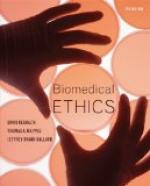|
This section contains 242 words (approx. 1 page at 300 words per page) |

|
1. Andy H. Barnett, Roger D. Blair, and David L. Kaserman contend that the shortage of organs available for transplant would disappear if organs could be bought and sold on the open market. Alasdair Palmer asserts, however, that legalizing the sale of organs would encourage criminals to kidnap victims for their organs. Which author makes a stronger case? Support your answer with examples from the viewpoints.
2. Linda C. Fentiman advocates a policy called presumed consent to ease the shortage of organs available for transplant. In your opinion, should consent from the potential donor be presumed or required? Explain. Should the next-of-kin be able to override the donor’s wishes? Why or why not?
3. The organization People for the Ethical Treatment of Animals contends that animal-to-human organ transplants should be banned since none have been successful. Jennifer Cunningham argues that if the transplant will save a human...
|
This section contains 242 words (approx. 1 page at 300 words per page) |

|




